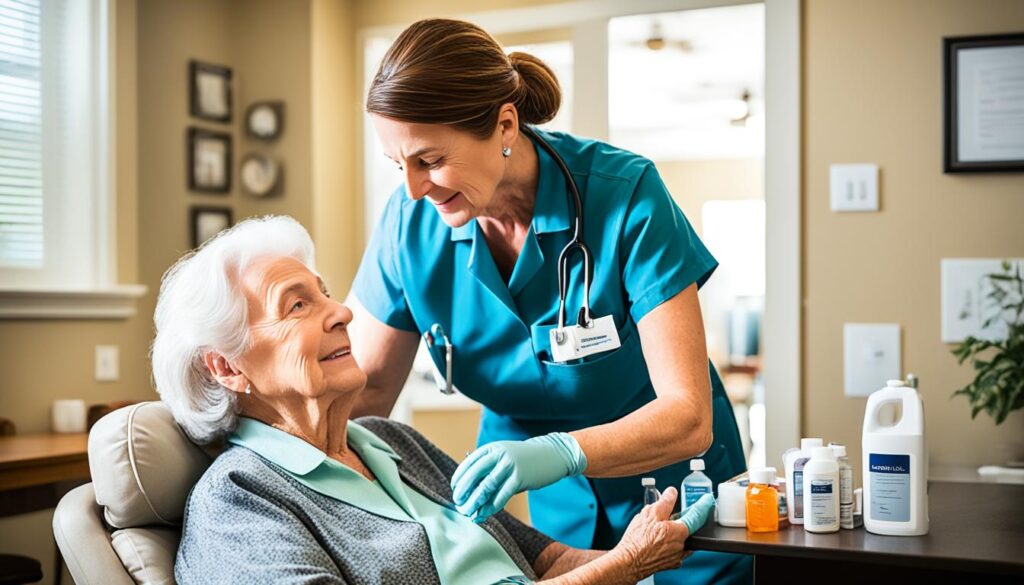
Comprehensive Home Care Home Based Services
February 17, 2024
Quality Home Health Care Company Near You
February 22, 2024Are you interested in a rewarding career in healthcare where you can make a meaningful difference in people’s lives? Consider becoming a home health aide. In this article, we will explore the home health aide job description and duties of a home health aide to give you a better understanding of this important role.
Home health aides provide essential healthcare services in the comfort of patients’ residences. They assist individuals with domestic and household tasks, ensuring their overall well-being and offering support with compassion. From transporting and accompanying patients to doctors’ offices or hospitals to administering simple prescribed medications, home health aides play a vital role in maintaining patients’ health and quality of life.
Essential Responsibilities of a Home Health Aide
As a home health aide, you are tasked with fulfilling a range of responsibilities to provide comprehensive care and support to individuals in their homes. Your daily tasks as a home health aide include:
- Providing personal care assistance such as bathing, dressing, grooming, and toileting
- Preparing and feeding meals according to dietary requirements
- Reminding patients to take medications
- Monitoring patients’ health status and reporting any changes
- Assisting with mobility and physical exercises
- Performing light housekeeping duties
- Providing companionship and emotional support
- Assisting with transportation and running errands
- Maintaining accurate records of care provided
- Adhering to individualized care plans
These responsibilities are crucial in ensuring the well-being and comfort of individuals who require home healthcare services. By fulfilling these tasks with dedication and compassion, you play a vital role in enhancing the quality of life for those under your care.

What Home Health Aides are not Allowed to Do
As valuable members of the healthcare team, home health aides play a crucial role in ensuring the well-being of individuals in their homes. However, it is important to understand that home health aides have certain limitations and are not allowed to perform certain tasks. Below are the tasks that home health aides are not permitted to do:
- Administering medication: Home health aides are not authorized to administer medications to patients. This task is typically reserved for licensed medical professionals such as nurses or physicians.
- Giving medical advice: Providing medical advice is beyond the scope of practice for home health aides. If patients have questions or concerns regarding their medical conditions or treatments, they should consult their primary care physicians or healthcare providers.
- Performing medical procedures: Home health aides do not have the training or qualifications to perform medical procedures. Procedures such as wound care, injections, or catheterization should be performed by licensed healthcare professionals.
- Conducting medical assessments: Assessing a patient’s medical condition or conducting comprehensive medical assessments is not within the role of a home health aide. This responsibility lies with medical professionals who are trained to diagnose and evaluate patients’ conditions.
- Providing nursing care: Home health aides do not provide nursing care, as this falls under the scope of licensed nurses. Nursing care tasks, such as wound dressing changes or catheter care, should be performed by qualified nurses.
- Offering medical assistance: Tasks that require extensive medical knowledge or specialized training, such as tube feeding or administering injections, are not within the purview of home health aides.
It is important to remember that home health aides work under specific guidelines and often under the supervision of nurses or physicians. Their roles should not be confused with those of licensed medical professionals. Home health aides contribute to the overall care and well-being of patients by assisting with personal care, mobility, and household tasks, as well as providing companionship and emotional support.
Understanding the limitations of home health aides ensures that patients receive appropriate and safe care from the appropriate healthcare professionals.

The Do's for Home Health Aides
Being a successful home health aide requires a combination of qualities and skills. Here are some essential do’s for home health aides to provide excellent care:
- Follow the patient’s care plan: It is crucial to adhere to the care plan developed by healthcare professionals. This includes following prescribed medication schedules, monitoring vital signs, and providing personalized care as instructed.
- Stay updated on care plan changes: Care plans may undergo modifications based on the patient’s condition and needs. As a home health aide, it is important to stay informed about any changes or updates and implement them accordingly.
- Ask for clarification when needed: If there is any confusion or uncertainty regarding the care plan or specific tasks, it is essential to seek clarification from healthcare professionals. Clear communication ensures the well-being and safety of the patient.
- Be organized and knowledgeable: Home health aides should maintain organized records of care provided, track medication schedules, and have a good understanding of the patient’s condition and specific requirements. This allows for efficient and effective care delivery.
- Show respect and kindness to patients: A compassionate and empathetic approach is vital in providing personal care and emotional support to patients. Treating patients with dignity and respect enhances their overall well-being and builds trust.
- Maintain effective communication: Collaboration with coworkers and healthcare professionals is crucial for comprehensive patient care. Proactive and open communication ensures smooth coordination and the exchange of important information.
- Prioritize punctuality: Being punctual is key to providing reliable care. Arriving on time and following scheduled appointments demonstrates professionalism and commitment to the patient’s well-being.
- Complete all assigned tasks: In addition to personal care, home health aides are responsible for tasks such as housekeeping and meal preparation. Ensuring all assigned tasks are completed contributes to the overall comfort and satisfaction of the patient.
- Monitor patient’s well-being and report changes: Home health aides play a vital role in monitoring the patient’s health and well-being. This includes observing any changes in condition and promptly reporting them to the primary care physician or attending nurse.
By following these do’s, home health aides can provide exceptional care that meets the needs and enhances the quality of life for their patients.

Effective Communication for Home Health Aides
Effective communication is a vital skill for home health aides, enabling them to provide the best possible care and support to their patients. By honing their communication skills, home health aides can establish strong rapport with patients, collaborate effectively with colleagues, and foster positive relationships with the patients’ family members and healthcare professionals.
Active Listening and Respectful Conversations
One key aspect of effective communication is active listening. Home health aides should attentively listen to instructions, patient concerns, and feedback from healthcare professionals. By actively listening, home health aides demonstrate their commitment to understanding and meeting the patients’ needs.
In addition to active listening, home health aides should engage in respectful conversations. They should show respect for the opinions and perspectives of others, fostering an environment of open dialogue and trust. By being open and honest in their conversations, home health aides can build strong connections with patients and their families.
Effective Communication with Different Stakeholders
Home health aides interact with various stakeholders, including coworkers, patients’ family members, and healthcare professionals. Effective communication with these individuals ensures that everyone is on the same page regarding patient care needs and safety protocols.
When communicating with coworkers, home health aides should share relevant information and provide updates on patient conditions. This promotes continuity of care and helps prevent mistakes or misunderstandings.
Home health aides should also maintain open lines of communication with patients’ family members. Regular updates on patient progress and any concerns or observations help reassure family members and foster trust in the care being provided.
When working alongside healthcare professionals, home health aides should effectively communicate observations and follow care plans. Clear communication with nurses and physicians ensures that any changes in the patient’s condition are promptly addressed, contributing to enhanced patient outcomes.
Adhering to Standards and Requirements
Home health aides should adhere to home health education standards and state compliance requirements related to communication. This includes respecting patient confidentiality, maintaining accurate and timely documentation, and following agency protocols for reporting and communication.
By adhering to these standards, home health aides demonstrate their commitment to professionalism and quality care. They contribute to a collaborative and coordinated healthcare team, working together to support the well-being and comfort of their patients.
Effective communication is a cornerstone of quality home healthcare. By actively listening, engaging in respectful conversations, communicating effectively with different stakeholders, and adhering to communication standards, home health aides can provide exceptional care and contribute to positive patient outcomes.
Professionalism and Organization for Home Health Aides
As home health aides, professionalism and organization are key traits to prioritize in your work. By embodying these qualities, you can ensure that you deliver the highest level of care to your patients while creating a positive working environment.
Respecting patient confidentiality is of utmost importance. As a healthcare professional, it is essential to maintain the privacy and confidentiality of the individuals you care for. Always handle sensitive information with discretion and adhere to HIPAA regulations, as it is crucial for building trust with your patients.
Understanding your role in the client’s home is another aspect of professionalism. Remember that you are a guest in their space, and it is essential to uphold their boundaries and respect their personal belongings. Treat their home as you would want your own to be treated, ensuring cleanliness and tidiness throughout your care visits.
Being respectful and kind to patients is a fundamental aspect of providing professional care. Show empathy, compassion, and patience when interacting with patients, as this helps create a comfortable and trusting environment. Establishing a positive rapport and building relationships based on mutual respect will contribute to better patient outcomes.
Adhering to the care plan and agency procedures is crucial for maintaining professionalism and providing consistent care. Take the time to familiarize yourself with the care plan provided by the healthcare professional overseeing the patient’s treatment. Following the provided guidelines and procedures ensures that you are delivering appropriate care and interventions.
Prioritizing patient safety is non-negotiable for any healthcare professional, including home health aides. Be diligent in identifying potential hazards in the patient’s home and take preventive measures to mitigate these risks. Additionally, always adhere to infection control practices to limit the spread of diseases and maintain a safe environment for both patients and caregivers.
Punctuality is of the essence in the professional realm. Arrive at your assigned shifts on time, allowing for any necessary preparations before you begin providing care. By being punctual, you demonstrate reliability and commitment to your role, ensuring that patients receive the care they need promptly.
Completing assigned tasks, including housekeeping responsibilities, is essential for maintaining an organized and efficient care environment. A tidy and clean space promotes patient comfort and reduces the risk of accidents or infections. Additionally, staying organized and knowledgeable about patient needs and care plans allows for more effective and targeted care provision.
Remember, professionalism and organization are not optional but rather integral components of being a home health aide. Embrace these qualities to deliver exceptional care to your patients, foster a positive working environment, and contribute to improved patient outcomes.
Conclusion
Home health aides play a crucial role in providing care and support to individuals in their homes. With a wide range of responsibilities, including personal care assistance, meal preparation, medication reminders, health monitoring, and more, home health aides are dedicated to enhancing the overall well-being and quality of life for their patients.
By understanding their duties, responsibilities, and limitations, home health aides can excel in their role. Effective communication, adherence to care plans, and continuous learning are key factors that contribute to providing quality care. Home health aides provide not only physical support but also companionship and emotional support, creating a comforting environment for their patients.
With their dedication, compassion, and professionalism, home health aides make a meaningful difference in the lives of the individuals they care for. Whether it’s assisting with daily tasks, providing medical reminders, or offering companionship, home health aides go above and beyond to ensure their patients receive the care they deserve. Their commitment to their responsibilities as home health aides is essential in enabling individuals to maintain their independence and stay in the comfort of their own homes.
FAQ
What is the job description of a home health aide?
Home health aides provide health care services in patients’ residences, performing domestic and household tasks, transporting and accompanying patients to doctors’ offices or hospitals. They also administer simple prescribed medications, assist with clients’ personal care activities, monitor patients’ vital signs, maintain patients’ care records, assist with mobility and physical therapies/exercises, instruct and counsel patients and families on diet and exercise, collect routine specimens, and provide companionship and emotional support.
What are the essential responsibilities of a home health aide?
The essential responsibilities of a home health aide include providing personal care assistance such as bathing, dressing, grooming, and toileting, preparing and feeding meals according to dietary requirements, reminding patients to take medications, monitoring patients’ health status and reporting any changes, assisting with mobility and physical exercises, performing light housekeeping duties, providing companionship and emotional support, assisting with transportation and errands, maintaining accurate records of care provided, and adhering to individualized care plans.
What tasks are home health aides not allowed to perform?
Home health aides are not allowed to perform tasks such as administering medication, giving medical advice, performing medical procedures, conducting medical assessments, providing nursing care, and offering medical assistance such as tube feeding or injections. They are also not responsible for household duties and physical therapy. Home health aides work under specific guidelines, often under the supervision of nurses or physicians, and their roles should not be confused with those of licensed medical professionals.
What qualities and skills are important for home health aides?
Home health aides should have proven working experience in the field, the ability to monitor vital signs and collect specimens, familiarity with basic nutrition and personal hygiene standards, proficiency in English, nursing and health care administration skills, and a caring and compassionate personality.
What is the importance of effective communication for home health aides?
Effective communication is essential for home health aides. They should actively listen to instructions, respect the opinions of others, be open and honest in conversations, and communicate effectively with coworkers, patients’ family members, and healthcare professionals. Good communication helps prevent mistakes, ensures everyone is on the same page regarding patient care needs and safety protocols, and creates a supportive working environment.
How can home health aides maintain professionalism and organization in their work?
Home health aides should prioritize professionalism and organization in their work. This includes respecting patient confidentiality, understanding their role in the client’s home, being respectful and kind to patients, adhering to the care plan and agency procedures, prioritizing patient safety, showing up on time, completing assigned tasks including housekeeping, and staying organized and knowledgeable about patient needs and care plans.
What are the overall responsibilities and duties of home health aides?
Home health aides play a crucial role in providing care and support to individuals in their homes. Their responsibilities include personal care assistance, meal preparation and feeding, medication reminders, health monitoring, mobility assistance, housekeeping and maintenance, companionship and emotional support, transportation and errands, effective communication, adherence to care plans, and continuous learning. By understanding their duties, responsibilities, and limitations, home health aides can excel at providing quality care to their patients and contribute to their overall well-being and quality of life.




